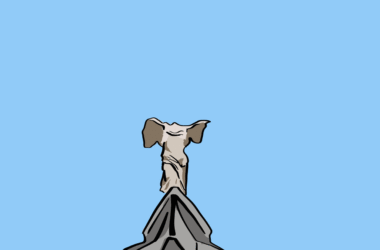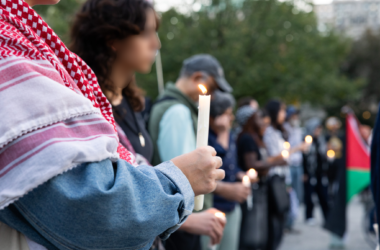
 Sam Reynolds
Sam ReynoldsLast Sunday morning, the nine students who remained on the sixth floor of the James Administration Building were peacefully evicted by the police. The students had occupied the sixth floor for 118 hours.
On Feb. 7, a group of 21 students entered the office of the Deputy Provost (Student Life and Learning) Morton Mendelson following a rally to protest the administration’s rejection of the fall referendum results regarding QPIRG and CKUT Radio. The occupiers demanded that the administration accept the referendum results, which would enable QPIRG and CKUT to continue to exist and would allow opt-outs to go offline. They also demanded Mendelson’s resignation. Over half of the students left over the course of following five days for varying reasons.
The police evicted the remaining students just before 9 a.m. on Sunday. In an email to students, Vice-Principal (Administration and Finance) Michael Di Grappa explained that standard police procedure was applied, with security personnel first reading a formal eviction notice.
One of the occupiers, who wished to remain anonymous, told the Tribune that security first forcefully entered the occupied office.
“It wasn’t clear that it was the police coming in,” she said. “Security guards pushed the door open, forced their way in, although we had a cabinet in front of the door to secure ourselves inside. One of my friends has a big bruise because he tried to stop the door from opening.”
The occupier said that as soon as her co-occupier saw police from the corner of his eye, he stepped back. The group had previously decided to leave peacefully if police arrived.
“We talked to lawyers before, and even while we were inside [James Admin], we were in contact with lawyers making sure [we knew what to do], especially with police,” the occupier said. “[We] expected that the police were coming … a lot of us felt uncomfortable with being arrested and having a criminal record. So we decided that if police [came], we were going to leave peacefully.”
According to both Di Grappa’s email and the occupier, a security guard read the notice, which stated that the occupiers had five minutes to collect their belongings and leave of their own accord. If the police had to physically remove them, the police could charge them with resisting arrest.
“We were pretty well organized because the day before we had heard that we might go into negotiations with QPIRG and the administration, so we had cleaned up the place and organized all of our things,” the occupier said. “We just had to collect the papers and fully consolidate all of our things.”
After collecting their belongings, the protesters walked out of the building peacefully. The email further stated that the occupiers were offered first aid, assistance, food, and contact for counseling services.
“[The first aid and assistance] were mentioned [to us] in passing, it wasn’t like they had people there just in case people were hurt,” the occupier noted. The occupier said that there was food in a tent set up outside James Admin, where two people had spent the night.
“We had to move 50 pounds of food in a tent, couches, and blankets,” the occupier said. “I thought it was ridiculous that they were making us do that. We were also told that we were not allowed on campus for the rest of the day.”
Di Grappa’s email further mentions that the nine occupiers “gave the security agents a letter of apology to the staff who work in this area.”
“We did not give a letter of apology—I was one of the people who wrote it,” the occupier said. “It was a letter recognizing the inconvenience that we had caused to the staff that were working there and apologizing for eating their food when we had no personal provisions left.”
In his email, Di Grappa explained why the administration decided to call the police.
“University activities had been obstructed for five days, and after many attempts to talk to the protestors about leaving the building peacefully, tactics to make the protestors uncomfortable in the space and after discussion of other options, we were no closer to a resolution,” Di Grappa wrote.
Di Grappa noted that the administration was not willing to negotiate with the occupiers about their demands. “We do not believe that negotiations on key matters concerning the university should take place under occupation or threat of occupation,” he wrote. “For example, negotiations on the referendum need to take place with QPIRG only, not the occupiers (CKUT and the administration had an agreement). Therefore, we were prepared to talk only about how the occupiers might leave, while the occupiers wanted to negotiate only on their demands.”
Doug Sweet, director of McGill media relations, said that the James Administration building reopened Sunday morning for cleaning.
“It was a bit of a mess but it certainly had not been trashed,” Sweet said. “We’re very glad [the occupation] ended peacefully, and we’re looking forward to having a big conversation with the community about what is acceptable on campus.”





